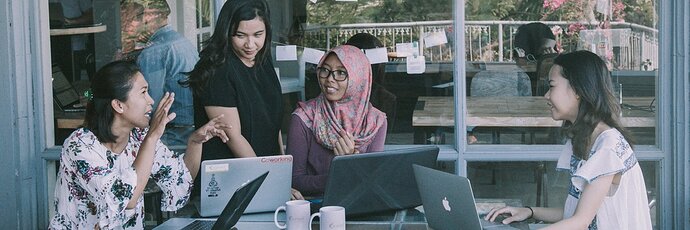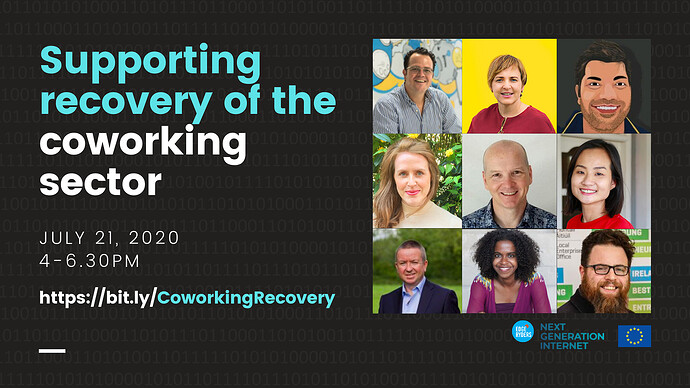A summary of this post can be found here: Faye Alund - President of Coworking Indonesia and Co-founder of KUMPUL
hi, I’m Faye Alund and I’m the CEO and co-founder of Kumpul which is a co-learning platform that provides quality programs as an engine for ecosystem builders. I’m also the president of Coworking Indonesia association.
Back in 2015, we only had 20 to 30 players across Indonesia and not all were active. And it was so difficult to explain what coworking is and to onboard buy-ins and partnerships from other sectors like corporations and governments. So we initiated this movement and it grew. Now, there are 300 spaces, locations run by maybe almost 200 operators. We believe that coworking is one of the most effective ecosystem builders, as it’s a new way of having a more collaborative office, but it’s still your project.
Kumpul thinks, “Why don’t we actually collect all of those programs built in the partnerships, built in the sponsorships on national level and then blast it through the coworking network?” We are in a good position because know who’s doing what, we know who’s good in what sector because we really believe that coworking is not just the square meter. So every year, we do an unconference for coworking players in Indonesia.
Kumpul is currently creating a tech platform that can disperse all these quality programs to the hubs. We all believe in partnerships and collaboration. For example, Startup Weekend is an event started in Boulder, Colorado that gives back to the community programs. It’s actually something like a hackathon for startups, meaning that you come in on Friday evening, you network, you pitch your ideas, you get team members, on Saturday, you will receive a lot of coachings and sessions, and on Sunday, you go market calibrations, create your MVP, and then you really pitch to the judges on Sunday afternoon. So just in 54 hours, you can test whether your idea is a valid business idea or not.
When you talk to young people in smaller cities in Indonesia, everybody wants to become civil servants because of income security and whatever, whatever. It’s not bad that they want to become civil servant. “But you do realize that your salary will be paid by the country. Okay, the country gets money from taxes. And who pays taxes? Nobody, because the business are not there.”
Why couldn’t there be a Startup Weekend somewhere in Papua or a even smaller city? It’s all about access, then you get opportunity to grow. Just in half year, and then coming towards 2020 now, so we pushed Startup Weekend five times bigger. We trained more than 100 organizers in almost 30 cities, and then it was already run in 14 cities, so we ran like 35 Startup Weekends across Indonesia.
We realized that if we do everything offline, we are stuck. Only if you can have certain technology that can automate certain things that you can actually make the scale bigger and the impact bigger. This is why we started to do our tech platform. We still need to fundraise in order to really activate the development of the platform. And then COVID-19 happened of course – so we’re just trying to survive this year.
People are saying that the world is small. The world is not small. You’re just stuck in your bubble. So then you just meet the same people again and again and again. You need to burst that bubble, to enter other people’s bubble and other people’s bubbles. But then a place like coworking space is the one that can connect you with the relevant bubbles. Because you can, of course, meet other people randomly on Tinder or someone’s wedding, but then not necessarily relevant for your personal growth or your business growth.
So coworking is accelerating that serendipity. That’s how we explain coworking. But then most of our programs required people to meet offline, until COVID-19 happened. So COVID-19 is actually a blessing in disguise for us to really push forward the value of community activations and community engagement, and the values you actually give to your audience in terms of increasing of the professional skills and the network through digital platform. Because now, you have to do everything online.
Our tech platform is basically a marketplace of four programs that ecosystem builders can tap into. Let’s say my audience or my community is mostly creative or content media, or maybe digital startups or high-tech people, but I don’t have a lot of logistic-heavy programs. I would be on that platform and it would match me with the programs that are good for me.
If you want to run a Startup Weekend, for example, you will follow the training of trainers, training of facilitators. And then after that, you can be connected with other organizers around Indonesia, so this community of the organizers. Kumpul will also try to put in some revenue projections there, breaking down the ticketing model for a Startup Weekend, for example.
Indonesia is maybe the biggest archipelago in the world, so logistic and infrastructure is actually one of our main challenges, especially in the eastern part of Indonesia. The technology platform we use at Kampul includes Good Drive, Google online collaboration, and Locket.com which sells tickets and also has the streaming facilities which have become important with COVID-19.
When we did the Startup Weekend Indonesia online, we actually used six different digital platform to run the whole thing. Some speakers, when it’s just a keynote, we blast it through YouTube live stream, for example. But then we need also the back stage platform. Some people can use Zoom, of course, and we also used StreamYard and Google Meet. When the participants build their products and are mentored, they use Discord, and of course, Whatsapp.
In the future, I think Kumpul will just focus mostly on how you can actually activate a hub. If you want to run something, if you want to engage people, a movement or something, if you say that you’re an ecosystem builder, we can help those hubs to be alive, to grow and be sustainable. In terms of business models, it’s about not just blasting, but seeing if can this be enjoyed or impact more people than just the people in your city?
During this COVID-19, everybody is doing webinars and Zoom, and it’s everywhere. It’s like thousands of them, but some are not such strong programs. So what if we can curate and then we can have this as a package, and then as a platform, you can offer this to other hubs as a channel of marketing to look for participants, and then also as something that is a content also? It’s like white-labeling certain programs.
We are actually constantly thinking how we can benefit from utilizing the community network, and starting from our coworking network. People create so much, people record so much. And then that actually cost you money after the event finish because you need to store it, so we will activate a platform called Sekolah. A sekolah is a startup school, where people can buy a yearly membership.
Indonesia is one of the countries whose tech talent is quite low, and it’s still also not very equal in terms of infrastructure and digital infrastructure in Indonesia. If you’re talking about outreach, we will just touch a very small percentage of it. I already had these questions when we started Kumpul five years ago. My background was actually in program and community development. I was born and raised in Jakarta, and worked in Pakistan, Zimbabwe, Yemen, Maluku, in Ambon, and then also Aceh after tsunami. So I see the inequality in access, and this is why we do what we do right now.
I think the key is the power of community, and that’s why we feel we can activate certain things to make them more equal. I also truly believe of the local heroes strategy. It’s more powerful than having someone from London or from Jakarta coming all the way to tell you all this stuff.
Indonesia is just like hundreds little kingdoms and countries coming together, with, 300 languages and have more than 17,000 islands, so the cultural barriers are huge. For example, we want to run things this year initiating a movement of digital startups in Papua, but that’s eastern part of Indonesia, where church is crucial to onboard people. We are the biggest Muslim population in the world and in some areas religion is only established structure that works over there. So you really need to take it like case by case according to the community.
And then sometimes what we’re doing is also very abstract, so I also have to learn which angle and how we can translate it in the same frequency so you can have the buy-in, in order to have a bigger impact or scale. We are the national coordinator and strategic partner of many ministries, including 1000 Digital Startup, an initiative started by the Ministry of ICT. We will also run the startup innovation program for the Ministry of Tourism and Creative Economy this year, and we are also helping the Ministry of Maritime and Investment. Together with UNDP, they are pushing this. They are supporting AIS Forum, the Archipelagic and Island State Forum.
Indonesia hosted that forum end of October 2019 attended by countries that are still quite offline, still asking “What is startup? What is unicorns? What is all this digital economy?” but if we can create this, we can share it with other young people in other island states, and they can do the same or collaborate.
This conversation is part of our event on 21/7. Registration is free of charge. To get your ticket, just post a thoughtful comment here to help drive the thinking and learning forward and we will send you the access code. Did you sign up via eventbrite? We ask that you too contribute to the conversation here ahead of the event to ensure everyone is on the same page, better networking etc. More info.


